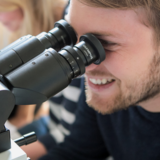Focus of the Ph.D. programs
Our research focuses on five core areas: Immunology, Cancer research and Oncology, Neuroscience, Cardiovascular medicine, and Medical imaging. We place great emphasis on interdisciplinary research. For us, it’s natural that medical scientists work together with researchers from other disciplines such as physics, chemistry, or mathematics to find joint solutions in research projects. Our doctoral studies are bundled in thematic programmes and offer a wide selection of interdisciplinary research projects to choose from. Our researchers and research groups are as diverse as our research, and this makes our work extremely exciting.

Educational objectives
Our Ph.D. programs aim to provide you with all the skills and knowledge you need to be an excellent scientist and science leader. During your Ph.D., you should decide whether you’d like to work in the academic or non-academic sector in the future and adapt your training accordingly. We’ll accompany you as you take your first steps as a young researcher and support you with the development of your independent project. The Ph.D. course is practice-oriented, as you’ll gain most of your academic skills and knowledge as part of a team. After successfully completing your training, you’ll be able to exhibit the following:
- A systemic understanding of a study field and proficiency in the skills and methods associated with this field.
- The ability to plan, design, implement and adapt a research project with scientific integrity.
- Original research output that increases the limits of knowledge and substantial research work.
- The ability to make your research output available to the scientific society according to national and international publication standards.
- The ability to perform critical analysis, evaluation, and synthesis of new and complex ideas.
- The ability to communicate with the professional environment, the scientific community, and society about basic questions of science and scientific politics.
- The ability to promote technological, social, and cultural progress within an academic and professional context in a knowledge society.
Workflow of the Ph.D. programs
Doctoral study takes at least six semesters and comprises 180 ECTS. All courses comprise a total of 30 hours each semester, which corresponds to 16.7% of the total duration of the course (based on a standard 40-hour work week). The remaining time (83.3%) is available for developing a project for your doctoral thesis.
The Ph.D. program will provide you with comprehensive scientific training in your chosen research area and general scientific skills to prepare you for various academic, medical, industrial, and public scientific careers. The learning occurs through practical training at the workplace, courses, including lectures, seminars, journal clubs, propaedeutics, ASIC courses, thesis seminars, or study periods abroad. You work with your supervisor and the rest of the research team the entire time.
Towards the end of your studies, you will work on an independent research project that will be documented in a doctoral thesis and defended publicly. We’ve put together detailed information on the curriculum, including a study plan proposal, here for your consideration.
Career outlook
Completion of a Ph.D. program gives you the opportunity to work in a wide variety of areas, including:
- Medical research
- Project management
- Science journalism
- Professorship and teaching
- Consultation to public administration, NGOs and industry
- Marketing and Sales
- Innovation and product development
- Quality management
- Funding